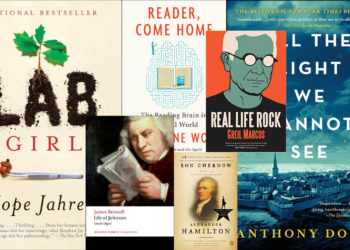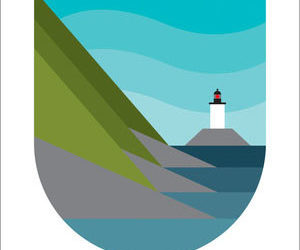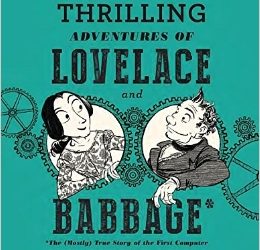Editor’s Note: Every year around the US Thanksgiving holiday, we take a moment to pause and look back on the best books we encountered (not a “best books of 2021″ list, but a list of the best books the Chefs read during 2021 — the books might be classics, a few years old, or brand new). Last year, we expanded our list to include any sort of cultural creation or experience our Chefs wanted to share. As our long stretch of pandemic isolation wears on, we hope some of our suggestions can provide you with inspiration, or at least distraction, and bring some joy to your days.
Here’s Part 1 of our list, Part 2 tomorrow.
Jill O’Neill
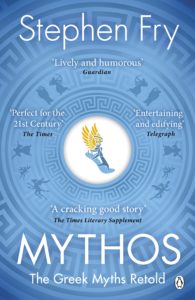 Stories from mythology have a certain familiarity no matter who is telling the tale; what makes them interesting reading is the particular slant adopted in telling the familiar tale and the tone of language. Circe was generally perceived as a wicked seducer of heroes until Madeleine Miller reframed her in the 21st century novel, Circe. Different creators present the stories for their own time and in a particular context. Miller did it her way in 2018 and I can tell you this year that Stephen Fry does it in an entirely different but equally brilliant way.
Stories from mythology have a certain familiarity no matter who is telling the tale; what makes them interesting reading is the particular slant adopted in telling the familiar tale and the tone of language. Circe was generally perceived as a wicked seducer of heroes until Madeleine Miller reframed her in the 21st century novel, Circe. Different creators present the stories for their own time and in a particular context. Miller did it her way in 2018 and I can tell you this year that Stephen Fry does it in an entirely different but equally brilliant way.
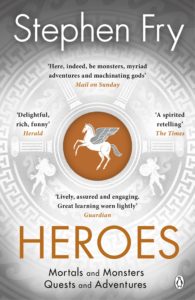 Writing for adults, Fry’s Mythos trilogy (Mythos in 2019, Heroes in 2020, and Troy in 2021) covers the range of classical Greek myths. Across the three books, his re-tellings incorporate some of the more obscure details of the stories but his prose has a wit and dry humor that matches 21st century sensibilities.
Writing for adults, Fry’s Mythos trilogy (Mythos in 2019, Heroes in 2020, and Troy in 2021) covers the range of classical Greek myths. Across the three books, his re-tellings incorporate some of the more obscure details of the stories but his prose has a wit and dry humor that matches 21st century sensibilities.
The physical books themselves have outstanding production values and the many color reproductions of classical artwork included are a nice design element that doesn’t overwhelm. (Translation: Whether or not you’re buying copies to give as Christmas presents, get your money’s worth and spring for the hardcovers.)
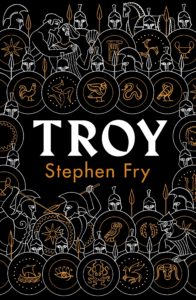 A quote from Heroes provides you with the flavor of Fry’s gift for establishing a dramatic scene:
A quote from Heroes provides you with the flavor of Fry’s gift for establishing a dramatic scene:
Medea stepped forward. The dragon hissed. Medea threw up a hand and sang out some words that Jason could not quite hear. The dragon lowered its head so that it was level with Medea. She stared deep into the vertical slits of its yellow eyes., the eyes that could never close, chanting her incantations all the while. The dragon froze, its mouth sagged open, and great strands of drool dropped to the ground. The grass and moss below hissed and steamed as the venomous saliva hit them. Medea took dried herbs, roots and flowers from her satchel and rubbed them into a ball in the palms of her hands. The dragon was frozen and immobile, but Jason could hear the slow panting of its breath.
Of course, two pages later, Fry notes that Medea beheads her younger brother and it is at this point that the hero Jason sensibly questions his romantic attraction to her.
Fry’s books do not sanitize the behaviors of either gods or heroes, so again I stress that these are not intended for middle-school readers or younger. However, grown-ups will find the trilogy to be an enjoyable and thoroughly immersive reading experience.
Lettie Conrad
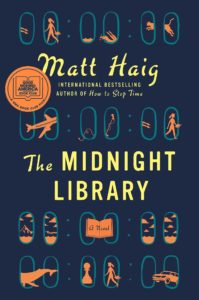 The Midnight Library by Matt Haig is the first novel I’ve read since I started my PhD. After finishing my thesis this summer, it was long overdue — and, thanks to my niece, Maya, this was the perfect fiction title for my reentry into non-academic reading. With equal doses of harsh truth and magical realism, Haig’s British charm, exquisite word choice, and delicious imagery drew me in for hours at a time.
The Midnight Library by Matt Haig is the first novel I’ve read since I started my PhD. After finishing my thesis this summer, it was long overdue — and, thanks to my niece, Maya, this was the perfect fiction title for my reentry into non-academic reading. With equal doses of harsh truth and magical realism, Haig’s British charm, exquisite word choice, and delicious imagery drew me in for hours at a time.
From page one, there is an ominous tension surrounding our heroine, Nora Seed. While you find yourself rooting for her to find happiness, she seems at the start to be on a collision course with misery. However, at a profound moment of crisis, Nora’s grade-school librarian and mentor, Mrs. Elm, takes her on a metaphysical journey through the pages of what-would-have-been. You see, the Midnight Library houses an unusual collection of tomes: Books of regret.
As Nora explores what life would have been like if she had made different choices, the reader is treated to many rich vignettes and colorful variations of Nora and her recurring cast of friends and family. In one life, Nora wears garish neon gear and shares a flat in Australia with a spaced-out video-gaming loaf of a roommate. In another chapter, Nora is a mega-successful former Olympian whose career is managed by her (otherwise estranged) brother. Through most of the book, it’s unclear where this kaleidoscope of possibilities will take our heroine — to find out, you must read for yourself!
Haig’s Midnight Library establishes a more viable multiverse than I’ve encountered in some time. This holiday season, share this story with a loved one, take turns reading it aloud to one another, and let Haig transport you to The Midnight Library.
Rick Anderson
 One of my favorite album releases of the year is a new recording Hildegard von Bingen’s Ordo Virtutem. Hildegard was a 12th-century abbess, now famous for being something of a Renaissance woman more than a hundred years before the Renaissance. She was a composer, philosopher, theologian, and natural scientist, and recorded numerous spiritual visions. But since the 1980s she has been best known for her music, which consists of surpassingly beautiful plainchant written for the nuns she supervised in her abbey. One of her most remarkable compositions is Ordo Virtutem, a sung morality play that depicts a wandering soul struggling to choose between good and evil. She is enticed by the Virtues (represented by the women’s voices) and by the Devil (portrayed by a man, who never sings; he only speaks and shouts). Seraphic Fire’s performance of this work is passionate and ethereal by turns, and they sing with a magnificent blend. In his role as the Devil, James K. Bass is suitably bombastic, sneering, and pathetic. If you’re looking for a starting place with the music of Hildegard, I’d actually recommend a different recording – A Feather on the Breath of God by the Gothic Voices, featuring the magnificent soprano Emma Kirkby. But Ordo Virtutem would make a great second stop.
One of my favorite album releases of the year is a new recording Hildegard von Bingen’s Ordo Virtutem. Hildegard was a 12th-century abbess, now famous for being something of a Renaissance woman more than a hundred years before the Renaissance. She was a composer, philosopher, theologian, and natural scientist, and recorded numerous spiritual visions. But since the 1980s she has been best known for her music, which consists of surpassingly beautiful plainchant written for the nuns she supervised in her abbey. One of her most remarkable compositions is Ordo Virtutem, a sung morality play that depicts a wandering soul struggling to choose between good and evil. She is enticed by the Virtues (represented by the women’s voices) and by the Devil (portrayed by a man, who never sings; he only speaks and shouts). Seraphic Fire’s performance of this work is passionate and ethereal by turns, and they sing with a magnificent blend. In his role as the Devil, James K. Bass is suitably bombastic, sneering, and pathetic. If you’re looking for a starting place with the music of Hildegard, I’d actually recommend a different recording – A Feather on the Breath of God by the Gothic Voices, featuring the magnificent soprano Emma Kirkby. But Ordo Virtutem would make a great second stop.
Joe Esposito
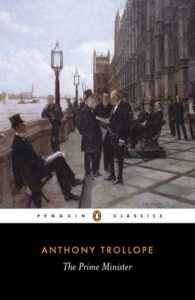 This has been a good year for good books. So many that I would be happy to recommend. Here’s a sample: Virginia Woolf, “Mrs. Dalloway”; Toni Morrison, “Beloved”; Saul Bellow, “The Adventures of Augie March”; Abdulrazak Gurnah, “Paradise”; and Kazuo Ishiguro, “Klara and the Sun.” All these books except “Mrs. Dalloway” are by Nobel Prize winners, and with Woolf it’s an injustice. “Mrs. Dalloway” improves markedly in the rereading. The Ishiguro is perhaps the closest to my own sensibility. I am eagerly reading through all of Ishiguro’s books now.
This has been a good year for good books. So many that I would be happy to recommend. Here’s a sample: Virginia Woolf, “Mrs. Dalloway”; Toni Morrison, “Beloved”; Saul Bellow, “The Adventures of Augie March”; Abdulrazak Gurnah, “Paradise”; and Kazuo Ishiguro, “Klara and the Sun.” All these books except “Mrs. Dalloway” are by Nobel Prize winners, and with Woolf it’s an injustice. “Mrs. Dalloway” improves markedly in the rereading. The Ishiguro is perhaps the closest to my own sensibility. I am eagerly reading through all of Ishiguro’s books now.
But to distinguish between books that are admired and books that are a sheer pleasure to read, I confess to a guilty pleasure this year, as I read Anthony Trollope’s The Prime Minister (1876). Every time I read another book by Trollope, I vow that that is the end, but I then succumb to the costumes, the balls, the drawing-room conversations, and the internal meditations of the principal characters. The books are big, fat, and cloyingly sweet, like eating an entire box of chocolates in a single sitting. Trollope was the most Victorian of the Victorians, and what company he kept! Dickens, Thackeray, the Brontes, George Eliot, and so many more, but it is Trollope who investigates the world of people in authority, the politicians, bishops, peers, and commercial giants (don’t miss The Way We Live Now). In a period whose literature seems to have a teleological dimension, Trollope seems like the final stop on the line, before the world takes a breath and leaps toward Henry James and the first explorations of consciousness that mark the modern period.
But that is it! No more! But I do see a copy of The Duke’s Children on the top bookshelf . . .
David Crotty
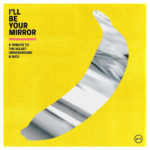 Another year of quarantine and solitude has at least had the benefit of providing another year of the time and space needed for reading and listening. On the musical front, Lucinda Williams’ brilliant series of live sets of songs (discussed previously in this post) remains a highlight, as does a reinterpretation of one of the greatest and certainly the most influential rock albums of all time, I’ll Be Your Mirror: A Tribute to “The Velvet Underground & Nico” which includes versions from Iggy Pop, St. Vincent, Courtney Barnett, Kurt Vile, REM’s Michael Stipe, and Sonic Youth’s Thurston Moore.
Another year of quarantine and solitude has at least had the benefit of providing another year of the time and space needed for reading and listening. On the musical front, Lucinda Williams’ brilliant series of live sets of songs (discussed previously in this post) remains a highlight, as does a reinterpretation of one of the greatest and certainly the most influential rock albums of all time, I’ll Be Your Mirror: A Tribute to “The Velvet Underground & Nico” which includes versions from Iggy Pop, St. Vincent, Courtney Barnett, Kurt Vile, REM’s Michael Stipe, and Sonic Youth’s Thurston Moore. 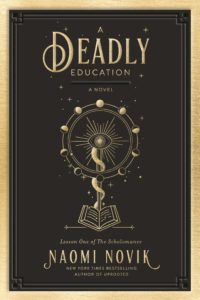 For those who share my leaning toward science fiction/fantasy novels, Harrow the Ninth by Tamsyn Muir blew my mind, so much so that I had to immediately re-read of its predecessor, Gideon the Ninth with a new understanding. You may also enjoy the new series from Naomi Novik, beginning with A Deadly Education, followed by The Last Graduate, which I can best describe as Harry Potter, except set in a school where there are no adults present, and that is actively trying to kill all the students.
For those who share my leaning toward science fiction/fantasy novels, Harrow the Ninth by Tamsyn Muir blew my mind, so much so that I had to immediately re-read of its predecessor, Gideon the Ninth with a new understanding. You may also enjoy the new series from Naomi Novik, beginning with A Deadly Education, followed by The Last Graduate, which I can best describe as Harry Potter, except set in a school where there are no adults present, and that is actively trying to kill all the students.
But I wanted to focus on a book that’s been a slow, but constantly rewarding read for me over the last year, Ryan North’s How to Invent Everything: A Survival Guide for the Stranded Time Traveler. This is a non-fiction book about civilization and technology, framed in a fictional conceit — it is written as an emergency manual that you would find in the FC3000™ time machine that you’ve rented for a jaunt into the past. The FC3000™, perhaps being a bit unreliable, includes this book to help you in case the machine breaks down and you are stuck in the past. Essentially, it is a manual for reinventing civilization.
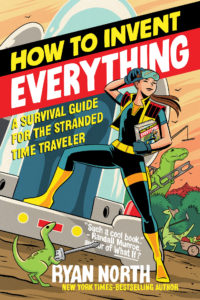 And let’s be clear, since you may be stuck at any point in the past, the invention of everything important is covered here, starting with “The Five Fundamental Technologies You Need for Your Civilization”: spoken language, written language, numbers, the scientific method, and calorie surplus. From there it goes on through everything you’ll need to know, including inventing bread (and also: beer) (also: alcohol) (“Civilization pro tip: don’t let anyone tell you that bread is vegetarian”), medicine, trigonometry, and eventually computers. All of this is told in an easily understandable and entertaining voice, with great humor from author Ryan North (perhaps best known as the award winning author of, in my opinion, the best comic series of the 21st century to date, The Unbeatable Squirrel Girl).
And let’s be clear, since you may be stuck at any point in the past, the invention of everything important is covered here, starting with “The Five Fundamental Technologies You Need for Your Civilization”: spoken language, written language, numbers, the scientific method, and calorie surplus. From there it goes on through everything you’ll need to know, including inventing bread (and also: beer) (also: alcohol) (“Civilization pro tip: don’t let anyone tell you that bread is vegetarian”), medicine, trigonometry, and eventually computers. All of this is told in an easily understandable and entertaining voice, with great humor from author Ryan North (perhaps best known as the award winning author of, in my opinion, the best comic series of the 21st century to date, The Unbeatable Squirrel Girl).
There’s a joy here in thinking about the basic things that we all take for granted, and what they mean to society — as well as truly understanding how they work. It’s also a real timesaver, since you’ll be super busy trying to reinvent civilization — as the chart showing basic math concepts notes: “Homo sapiens sapiens, a species that considers itself so smart that it put ‘smart’ in its own name twice, and in Latin, took more than 40,000 years to figure this chart out…We covered them in a single chart that took you a few minutes to read, at most. You can introduce them in an afternoon, saving thousands and thousands of years that humans wasted wandering around not knowing what a zero is. You’re welcome.”
Michael Clarke
With a three-year-old in the house, it has been a year steeped in children’s books. There are so many wonderful books being written today, in addition to the many classics. And with fewer trips to the library these days due to the pandemic, our books shelves are overflowing. A few of our favorites of recent vintage include:
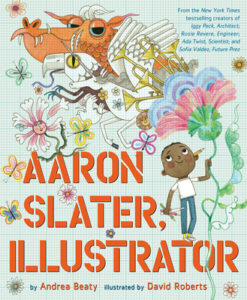 Aaron Slater, Illustrator by Andrea Beaty. Illustrated by David Roberts. (Abrams, 2021) The latest installment in The Questioners series has dropped just in time for the holidays. The Questioners is series of biographical sketches of the extraordinary kids in Miss Lila Greer’s 2nd grade classroom in Blue River Creek. Aaron Slater joins classmates Iggy Peck, Architect; Ada Twist, Scientist; Rosie Revere Engineer; and Sofia Valdez, Future Prez in this delightful series written in rhyming couplets and published on graph paper. Aaron Slater is the story of a boy with an innate artistic ability who struggles with dyslexia and how he uses his art to tell stories, gain self-confidence, and connect with his classmates.
Aaron Slater, Illustrator by Andrea Beaty. Illustrated by David Roberts. (Abrams, 2021) The latest installment in The Questioners series has dropped just in time for the holidays. The Questioners is series of biographical sketches of the extraordinary kids in Miss Lila Greer’s 2nd grade classroom in Blue River Creek. Aaron Slater joins classmates Iggy Peck, Architect; Ada Twist, Scientist; Rosie Revere Engineer; and Sofia Valdez, Future Prez in this delightful series written in rhyming couplets and published on graph paper. Aaron Slater is the story of a boy with an innate artistic ability who struggles with dyslexia and how he uses his art to tell stories, gain self-confidence, and connect with his classmates.
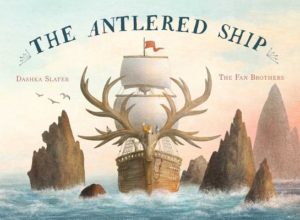 The Antlered Ship, by Dashka Slater. Illustrated by the Fan Brothers. (Beach Lane Books, 2017). This book is the story of Marco, a fox who has many questions about the world. To try to answer those questions, Marco sets sail with a flock of pigeons and a lost crew of deer on their antlered ship. They sail beyond the Land of Foxes, navigate the hazardous Maze of Sharp Rocks, fend off pirates, and ultimately make their way to Sweet Tree Island, which has delicious grass – but no answers to Marco’s questions. Marco learns that answers to the important questions in life can be hard to come by. But he also learns that the voyage is more important than the destination as are the friends you make along the way. Just watch out for pirates and make some hearty stew!
The Antlered Ship, by Dashka Slater. Illustrated by the Fan Brothers. (Beach Lane Books, 2017). This book is the story of Marco, a fox who has many questions about the world. To try to answer those questions, Marco sets sail with a flock of pigeons and a lost crew of deer on their antlered ship. They sail beyond the Land of Foxes, navigate the hazardous Maze of Sharp Rocks, fend off pirates, and ultimately make their way to Sweet Tree Island, which has delicious grass – but no answers to Marco’s questions. Marco learns that answers to the important questions in life can be hard to come by. But he also learns that the voyage is more important than the destination as are the friends you make along the way. Just watch out for pirates and make some hearty stew!
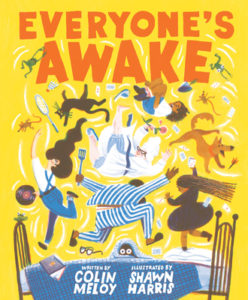 Everyone’s Awake, by Colin Meloy. Illustrated by Shawn Harris. (Chronicle Books, 2020). Colin Meloy is perhaps best known as the lead singer of The Decembrists. He is also, however, an accomplished children’s book author (this is his 5th children’s book). It is the story of a family living together in a lake house who are having some challenges in falling asleep (or maybe just the youngest family member dreams that they do) and the activities they occupy themselves with during the night (along with their cat, their dog, the ghost of long-dead Grandpa Paul, and a great many frogs). It is told in the form of a long poem, reminiscent of the Night Before Christmas, but one where the evening gets a little out of hand. Suitable for children of all ages and anyone up late.
Everyone’s Awake, by Colin Meloy. Illustrated by Shawn Harris. (Chronicle Books, 2020). Colin Meloy is perhaps best known as the lead singer of The Decembrists. He is also, however, an accomplished children’s book author (this is his 5th children’s book). It is the story of a family living together in a lake house who are having some challenges in falling asleep (or maybe just the youngest family member dreams that they do) and the activities they occupy themselves with during the night (along with their cat, their dog, the ghost of long-dead Grandpa Paul, and a great many frogs). It is told in the form of a long poem, reminiscent of the Night Before Christmas, but one where the evening gets a little out of hand. Suitable for children of all ages and anyone up late.
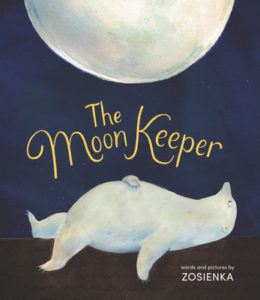 The Moon Keeper, by Zosienka (Harper Collins, 2020). The Moon Keeper (my personal favorite of the bunch) is the gorgeously illustrated tale of Emile, a polar bear who has been elected by the Night Creatures to be the new Moon Keeper. The moon keeper’s job is to look after the moon, clearing obscuring clouds, shooing away fruit bats, and generally keeping the moon company. One night, Emile notices something strange: the moon was getting smaller. To make sure, he draws a picture of the moon each night (Emile’s drawings of the moon are reminiscent of another moon keeper, that of Galileo Galilei). Emile is despondent but eventually learns, with the assistance of a large green bird, that the moon has cycles, which make him appreciate it even more.
The Moon Keeper, by Zosienka (Harper Collins, 2020). The Moon Keeper (my personal favorite of the bunch) is the gorgeously illustrated tale of Emile, a polar bear who has been elected by the Night Creatures to be the new Moon Keeper. The moon keeper’s job is to look after the moon, clearing obscuring clouds, shooing away fruit bats, and generally keeping the moon company. One night, Emile notices something strange: the moon was getting smaller. To make sure, he draws a picture of the moon each night (Emile’s drawings of the moon are reminiscent of another moon keeper, that of Galileo Galilei). Emile is despondent but eventually learns, with the assistance of a large green bird, that the moon has cycles, which make him appreciate it even more.
Discussion
3 Thoughts on "Chefs’ Selections: Best Books Read (and more!) During 2021, Part 1"
Thank you. A fun read!
Love these lists. Thanks, David Crotty, for including scifi/fantasy in the mix. And, Joe Esposito, go ahead and read The Duke’s Children. You know you want to! Trollope is among my favorite Victorian authors.
Personally, I prefer Trollope to Dickens, but everyone pales before the sheer intellect of George Eliot and Emily Bronte’s incantatory “Wuthering Heights.” Oh, but don’t miss “Villette” and “North and South” and “Vanity Fair” and . . . .
